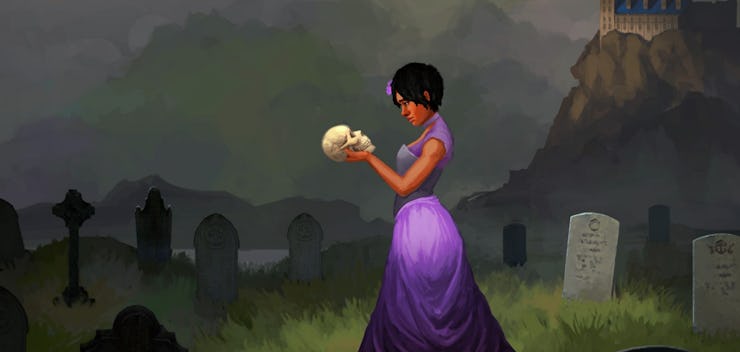You need to play the best time-loop game on Steam ASAP
Alas, poor Yorick!

It’s Groundhog Day, and besides six more weeks of winter, it also means it is the time for time-loops. The iconic Bill Murray film may have popularized this specific narrative, but today it can be found in almost every medium — including video games. While high-profile games like Deathloop fit the bill, the best implementation of a time-loop is the indie title Elsinore, which takes inspiration from an unexpected place — Hamlet.
The Play’s the Thing
Cinematic video games may be all the rage, but film and tv aren’t the only mediums from which video games can learn. Elsinore, from developer Golden Glitch Studios, looks to the theater and the work of William Shakespeare (who has left a mark on more video games than you would think).
Elsinore retells the story of Shakespeare’s Hamlet.
Upon first glance, Elsinore is a relatively faithful recreation of Hamlet inside a point-and-click adventure game, with the caveat that you witness the events of the play through the perspective of Ophelia. Of course, doomed Ophelia is not destined to see the play to the end and you quickly find yourself drowned in a pound.
Then you wake up in your bed.
The twist of Elsinore is that in this version of Hamlet, Ophelia is trapped in a mysterious time-loop, in which she is able to observe and interfere with the events of the narrative. Essentially rewriting the play as it happens. Mechanically you have access to a timeline of the day which will log essential events and how things change as you choose to follow different paths through the narrative.
Over the course of numerous loops, you lead Ophelia on a mission to uncover just what is happening to you, and like any good time loop, how to end the cycle.
Every loop opens up the opportunity to uncover a new story.
Theater as an art form is ephemeral, meaning that no performance of a show will ever be the same. Actors deliver lines differently, sets can be changed, and directors can give notes. Elsinore’s exploration of time-loops within Hamlet is a mechanical reinvention of this idea, with Ophelia acting as the inciting force that adds new paths and dimensions to characters that in one life might never be investigated.
Once More With Feeling
A clear influence on Elsinore is the immersive theater piece Sleep No More, a re-telling of Macbeth that invites audience members to wander through a larger collection of interconnected rooms and follow characters as they see fit. You can follow the path of Macbeth as Shakespeare intended, or you could choose to see what a random servant gets up to while politically scheming is afoot. Every character in Elsinore has their own schedule of events and tasks they need to get done. All of which can be interrupted, creating new paths like dominos being knocked down one after the other.
The player is invited to take on the role of Ophelia and test out different emotions and motivations for the protagonist. One day you might try to save Hamlet from his tragic end, while the next you could be fed up with constantly dying each loop and just try to annihilate everybody to be done with it. Some loops even break out of Hamlet and take a page from more modern plays like Tom Stoppard’s Rosencrantz and Guildenstern Are Dead. Crucially, the game does not tell you what you should be doing.
Elsinore expertly merges the storytelling of theater and video games.
Slowly, Elsinore reveals wrinkles to your predicament, namely with the introduction of Peter Quince. Quince sees through the loops and knows of Ophelia’s predicament, namely because he is the perpetrator. Throughout Elsinore’s narrative Ophelia will come upon thirteen different versions of an ending to the story, Quince wants you to choose one. This is not a case of “good” versus “bad” endings, it is just a choice that has to be made.
This is a challenge to the player, and expertly demonstrates Elsinore’s genius in using the language of theater to speak directly to a problem of interactive media like video games. In a not insignificant way, the player is at fault for Ophelia’s suffering. Both theater and video games require the audience in order to tell the story. They are both mediums that require a contract between the artist and the audience. Elsinore asks if your participation is harming Ophelia and the other residents of Elsinore. More than any prestigious game about “cycles of vîolence” Elsinore’s direct challenge to the player feels powerful.
Basing your game off one of the most famous plays from what many consider the greatest playwright to ever live is a ballsy move, but Elsinore threads that needle perfectly thanks to the unique benefits of the time-loop game mechanic — sometimes I wish it would never end.
Elsinore is available on PC via Steam for $9.99.